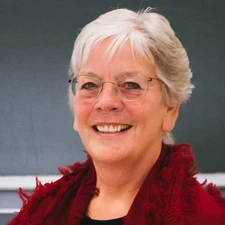Ingeborg Levin

The 2020 Alfred Wegener Medal & Honorary Membership is awarded to Ingeborg Levin for fundamental contributions to our present knowledge and understanding of greenhouse gases in the atmosphere, including the global carbon cycle.
As early as the 1980s Ingeborg Levin recognised that continuous worldwide measurements of radiocarbon concentrations in the atmosphere would reveal valuable information about the global carbon cycle. Driven by that creative insight, Levin established a global network of stations through which radiocarbon in atmospheric CO2 was regularly measured. This and many other measurement efforts by Levin have been mainly aimed at providing independent validation for inventory-based greenhouse gas emission estimates, which require precise, compatible and consistent long-term atmospheric measurements.
The measurements obtained through Levin’s efforts are widely used across the geoscience community to characterise associated carbon fluxes and have proven to be extremely important for our understanding of the global carbon cycle. They have provided key insights in atmospheric and ocean sciences as well as in biogeochemistry and climate science.
Using the atmospheric radiocarbon data, Levin’s group identified an overestimate in the air-sea gas exchange rate that implied the need for a 25% reduction in the oceanic uptake of anthropogenic CO2 calculated using ocean pCO2 measurements. Levin used the radiocarbon data to place unique constraints on global annual net primary productivity (NPP) and the turnover time of terrestrial carbon. Global estimates of NPP and turnover time are otherwise difficult to assess because of the strong heterogeneity in the terrestrial biosphere and the sparseness of field data.
The impact of Ingeborg Levin’s global atmospheric radiocarbon measurements is actually much broader. Her measurements of the decrease in atmospheric radiocarbon after nuclear weapons tests are used in applications in fields as diverse as forensics and neurobiology. Going forward, her work has the added potential to advance atmospheric monitoring techniques for emission reduction targets such as those included in the 2015 Paris Agreement, demonstrating the broader impact of her work to society.
It is hard to imagine what the fields of atmospheric sciences and biogeochemistry would look like today without Levin’s contributions. Her work practice over decades is a shining light of integrity, rigour and dedication, and she is an important role model for young scientists (male and female) everywhere.
